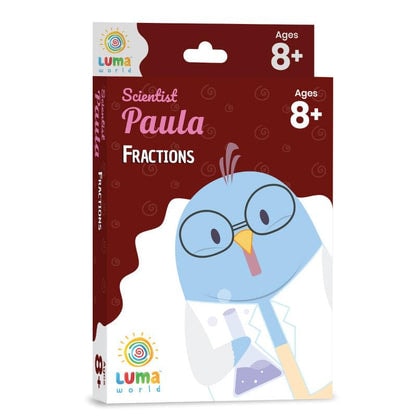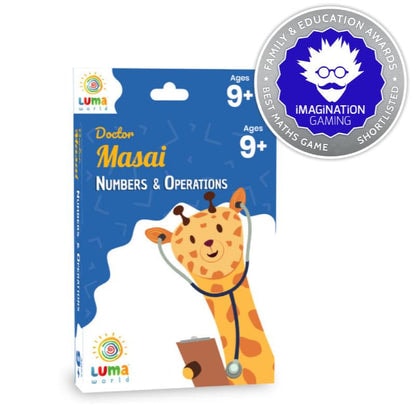How to Make Summer Vacation Fun & Educational with Flash Card Games
Zeba ParkarShare
The summer holidays are a time of enchantment for kids, filled with sunshine, freedom, and promise. It's the time when they can sleep in late, spend time outdoors, and enjoy quality time with family members. But to parents and teachers, summer holiday is also a time that presents a very real problem: the so-called summer slide. This is the loss of learning that occurs during the summer break, when students are not in their school routines. Studies indicate that children can lose as much as two months of academic achievement during the summer break, particularly in key areas such as math and reading.
Summer learning loss can build up year by year, ultimately expanding achievement gaps, particularly among students who lack access to ongoing learning beyond the classroom. Research shows that the school years that follow a loss of learning tend to start with weeks of remediation simply to catch students up to their own grade level. That's why it's critical for parents to devise ways to keep children remain active during this period of extended absence from school.
So how can you help your child practice math, build vocabulary, and strengthen skills like fine motor skills, all while enjoying their summer vacation? The answer is simpler than you think: flash card games.
Flash cards are more than simplistic review tools—they're a game to build knowledge, inspire curiosity, and encourage active engagement in learning. They enable children to discover concepts, figure out riddles, and play imaginatively that has absolutely nothing to do with doing homework. You can integrate them into your daily routine, from a morning ritual to a summer routine packed with enjoyable activities such as scavenger hunts, board games, or even operating a mock lemonade stand.
Whether your child is designing their own cards, quizzing friends, or reviewing key English concepts with adult help, flashcards offer endless possibilities. In this post, we’ll explore exciting ways to turn ordinary summer learning activities into a learning adventure your child will love—using nothing more than a few flash cards, creativity, and a bit of sunshine.
1. Why Summer Learning Matters
Prevent the Summer Slide with Flash Card Play
Flash card games are a fun way to keep students sharp, prevent summer learning loss, and prepare them for the next school year. While it may seem like a break from routine, summer vacation can actually be the perfect time to teach kids in creative, real-world applications that make learning stick.
Instead of traditional worksheets, children can use flash cards during daily activities like playing board games, setting up a lemonade stand, or going on scavenger hunts. These fun activities not only help children practice math and review English concepts, but also improve fine motor skills, memory, and decision-making.
By integrating flash card games into your summer schedule, you're giving your child meaningful, hands-on learning opportunities that reinforce what they’ve learned during the school year—and help them return to class confident and ready. It’s an engaging, effective way to beat the summer slide while keeping kids moving and curious.
Research Shows Alarming Trends
- Most kids forget up to 20% of what they learned during the school year.
- Math skills are often the hardest hit.
- Children from kindergarten to eighth grade are affected.
With just 15–20 minutes a day, flash cards can help kids practice math, vocabulary, and science concepts in bite-sized, memorable ways.
2. Building a Summer Flash Card Routine
Make Learning Part of the Summer Schedule
The secret to ongoing learning is building a summer routine that blends activity with regular practice. Children prosper on routine—even in summer. A well-balanced routine prevents the summer slide by incorporating summer learning experiences without overwhelming your child. Utilize flash cards for rapid, fun review sessions that reinforce essential math skills, vocabulary, and English concepts.
Whether breakfast, after playtime, or before bed time, short study bursts can have a powerful impact. Throw in board games, scavenger hunts, or even an imaginary store where children apply math using prices and change. When learning is play, students remain engaged and motivated. This framework facilitates advancement during the summer months and instills confidence for the upcoming school year, particularly when you monitor advancement creatively. The proper blend of learning and enjoyment keeps children motivated, active, and always on the go, ready for their next adventure.
Sample Flash Card Routine:
- Morning: Review 5–10 math or vocabulary cards
- Afternoon: Play a board game or flash card challenge
- Evening: Read children’s books based on new words learned
Track Progress in a Creative Way
Make it visual! Use sticker charts, printable logs, or an activity book where kids can check off what they’ve learned. This reinforces the idea that learning is a challenge they can conquer.
3. Turning Flash Cards into a Learning Adventure
Explore Real World Applications
Kids remember better when they see how learning connects to real life.
Try These Adventure Ideas:
- Lemonade stand: Use math flash cards to price drinks and count change
- Local farm visit: Use farm animal vocabulary flash cards before the trip
- Beach day scavenger hunt: Use nature or science flash cards to spot shells, seaweed, and insects
Teach Kids Through Play
Whether you're in the backyard or on the go, flashcard games can adapt to your child’s environment. It's learning disguised as play.
4. Strengthen Fine Motor Skills with Flash Cards
Add a Physical Challenge to Mental Learning
For younger kids, especially in kindergarten and first grade, improving fine motor skills is just as important as academics.
Ideas to Build Motor Skills:
- Pick up flash cards using tongs
- Clip cards to string with clothespins
- Use a paintbrush to “trace” answers in water or chalk
Make Learning Active
Let kids design their own cards with drawings or stickers. Not only does this build memory, but it also boosts creativity and engagement.
5. Flash Cards for Math Practice
Practice Math Without the Pressure
Math flash cards are timeless for a reason—they work. But they don’t have to feel like drills. You can make them into games that keep kids moving and thinking fast.
Flash Card Math Game Ideas:
- Flash Dash: Place cards around the room. Call out a problem—kids run to the answer!
- Flash Card Relay: Solve a card before tagging the next teammate
- Flash Card Tic-Tac-Toe: Answer a question correctly to place an X or O
Reinforce Grade-Level Skills
Customize cards by grade level so your child is practicing exactly what they need to succeed in the next school year.
6. Build Vocabulary the Fun Way
Introduce New Words with Flash Card Stories
Flash cards can turn into story prompts for creative storytelling. Each card represents a word your child must use in a sentence or tale.
Story Challenge:
- Draw 3 flash cards
- Make a silly story using all 3 words
- Act it out with friends or family members
Use Themed Flash Card Sets
Choose topics your child already loves—animals, beach, space, or superheroes. That familiarity makes learning less intimidating and more engaging.
7. Create Flash Card Scavenger Hunts
Mix Exploration and Education
The secret to ongoing learning is building a summer routine that blends activity with regular practice. Children prosper on routine—even in summer. A well-balanced routine prevents the summer slide by incorporating summer learning experiences without overwhelming your child. Utilize flash cards for rapid, fun review sessions that reinforce essential math skills, vocabulary, and English concepts.
Whether breakfast, after playtime, or before bedtime, short study bursts can have a powerful impact. Throw in board games, scavenger hunts, or even an imaginary store where children apply math using prices and change. One of the popular games we recommend is Scientist Paula Flashcards, which help kids not only learn the concept of fractions but master it making mental math much easier for future operations.

When learning is play, students remain engaged and motivated. This framework facilitates advancement during the summer months and instills confidence for the upcoming school year, particularly when you monitor advancement creatively. The proper blend of learning and enjoyment keeps children motivated, active, and always on the go, ready for their next adventure.
How to Play:
- Hide flash cards around the house or yard
- Give your child a list of clues or riddles
- Solve the flash card before moving on
This works great with multiple subjects—math, science, or English concepts—and can include the whole family.
Take It Outdoors
Try flash card hunts at:
- A local farm
- The store
- A walk around the neighborhood
Let the summer sun turn ordinary days into learning opportunities. Another activity you can do is use the local farm animals to teach your kids the same concepts, and then connect the learning concepts to their visual memory using Flashcard games like Doctor Masai Flashcards by counting the number of animals or using the animals to create the concept of counting and operations.

8. Use Flash Cards with Board Games
Combine Two Classics for Maximum Fun
Pairing flash cards with board games brings a new twist to traditional play. These hybrid games boost critical thinking, strategy, and cooperation.
Sample Ideas:
- Use a flash card before rolling the dice
- Answer a card correctly to earn bonus moves
- Replace trivia cards in a favorite game with your own flash cards
Involve the Whole Family
Game nights don’t have to be screen-based. Instead, gather family members for an educational and laughter-filled night that still sneaks in summer bridge activities.
9. Flash Card Challenges to Beat Boredom
Design Mini Competitions
Turn learning into a challenge with mini competitions. This makes academic review something kids look forward to.
Fun Flash Card Challenge Ideas:
- Speed Rounds: Who can get the most answers right in 60 seconds?
- Flash Freeze: Solve a card, then strike a pose or dance
- Memory Match: Combine flash cards with a memory game layout
Keep Kids Engaged with Incentives
Use stickers, tokens, or points to reward effort and progress. Tie rewards to real-world applications, like:
- Earning money for their lemonade stand
- Unlocking a new children’s book
- Choosing the next activity book
10. Let Kids Create Their Own Flash Cards
Ownership Increases Learning
When kids create their own learning tools, they feel more invested. This can be done by drawing, coloring, or writing definitions or new words themselves.
What They Learn While Creating:
- Spelling and grammar
- Categorization and sorting
- Visual memory skills
Use Flash Cards to Review the School Year
Ask your child to make flashcards of everything they remember from the last school year. Then use those cards to track progress or see what they’re excited to practice more.
Conclusion
Flash card games are not only academic—they're happy, lighthearted, and intensely memorable. Whether your child is entering kindergarten or eighth grade, flash cards are a playful, versatile tool to prevent summer slide, hone skills, and prepare for the next year.
Rather than a battle against screen time or summer learning loss, consider the summer break an opportunity to discover, create, and develop. From numbers to words, fine motor to everyday uses, the learning is all around you—you just need a set of flash cards and some creativity.
Take out the flash cards, apply the sunscreen, and embark on a learning experience your child will never forget. And if you find yourself confused head over to Toadbird to find the best collection of flashcard games that help prepare kids for their STEM learning as well as real life endeavors.